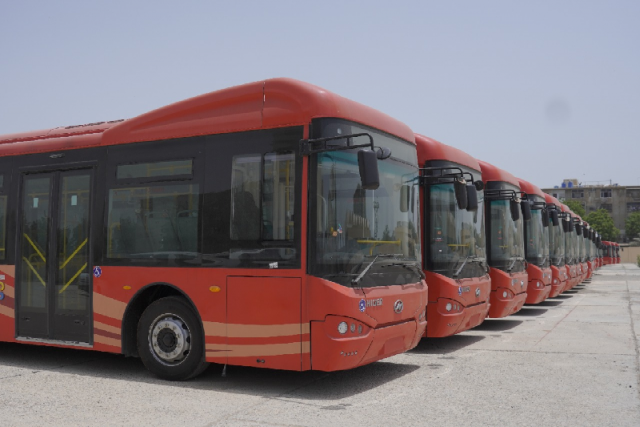World Bank report highlights shortage of 13,000 public buses in Karachi
Interim Sindh govt unveils a series of projects to revamp the city's transportation infrastructure

The interim Sindh government has unveiled an ambitious plan to tackle Karachi's severe public transport crisis, triggered by a substantial shortfall of approximately 13,000 buses as recommended by the World Bank.
Responding to the urgent need outlined in a World Bank report, the government is set to initiate a series of projects to revamp the city's transportation infrastructure.
During a comprehensive briefing by the Sindh Transport Department, the proposed projects were presented to Muhammad Younus Dagha, the Caretaker Provincial Minister of Finance, Revenue, and Planning and Development.
The World Bank report had emphasised the necessity of acquiring 15,000 buses to establish a comprehensive public transport system in the metropolis.
Presently, Karachi's public and private sectors operate a total of 1,029 buses, comprising 240 buses under the People's Bus Service, 100 buses in the Bus Rapid Transit (BRT) system, and 689 aging buses operated by the private sector. Additionally, a feasibility study is underway to acquire an extra 500 buses to reinforce the city's public transport network.
Also read: WATCH: Electric buses hit Karachi roads
Acknowledging the urgency of the situation, the caretaker minister emphasised the vital role of public-private partnerships in bridging the transport gap in Karachi. He underscored the need to encourage experienced private transporters to assume a more substantial role in the city's transportation sector.
Furthermore, Minister Younus Dagha issued directives to the Secretary of Transport, instructing the development of modalities for providing easy loans to private operators for bus procurement. He emphasised the significance of maintaining low-interest rates on these loans to incentivise the acquisition of new buses.
A notable proposal that surfaced during the briefing involved establishing an endowment fund to offer soft loans to experienced local transporters for purchasing public transport buses. These buses would be registered under the Sindh government's name until transporters complete their loan payments.
Participants in the briefing reached a consensus that these measures would enable local transporters to access affordable loans, thereby enhancing the quality of public transport services in the city. This initiative is considered a crucial step towards addressing the pressing need for additional buses in Karachi, where a significant shortage currently exists.
Under the leadership of Caretaker Minister Muhammad Younus Dagha, the interim Sindh government is taking proactive steps to improve public transportation in Karachi. The proposed projects and loan facilities are expected not only to augment the number of buses on the city's roads but also to elevate the overall quality and accessibility of public transport services, ultimately benefiting Karachi's residents.



















COMMENTS
Comments are moderated and generally will be posted if they are on-topic and not abusive.
For more information, please see our Comments FAQ